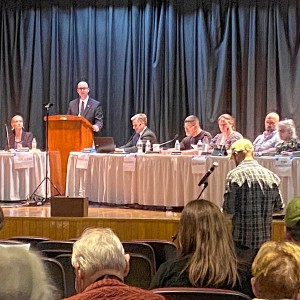Beacon Hill Roll Call: March 11 to March 15, 2024

| Published: 03-22-2024 12:14 PM |
Beacon Hill Roll Call records local senators’ votes on roll calls from the week of March 11 to March 15. There were no roll calls in the House last week.
The Senate, 40-0, approved and sent to the House a bill aimed at making early education and care money more accessible and affordable for young families. The bill would make high-cost state grants for early education and care providers permanent; increase the income threshold to make more families eligible for child care subsidies; and establish recommended salary and benefit guidelines for early childhood teachers commensurate with K-12 public school teachers.
Under current law, subsidies are limited to households whose incomes equal up to 50% of the state median income, or $73,000. The bill would raise the eligibility threshold to 85% of the state median income, or $124,000 for a family of four.
“Access to high-quality, affordable early education and child care is essential for the healthy development of young children, as well as for the economic well-being of working families and employers,” said Sen. Jason Lewis, D-Winchester, lead sponsor and Senate chair of the Committee on Education. “With the passage today of the Early Ed Act, Massachusetts is demonstrating national leadership in addressing the broken early education and child care system in our country.”
“An equitable and competitive commonwealth is one in which every child and family has access to affordable quality early education,” said Senate President Karen Spilka, D-Ashland. “At the same time, we must recognize the incredible work of the providers who are shaping the minds and hearts of our earliest learners. Today I’m proud that the Massachusetts Senate is once again taking action to lower costs for families, open up more opportunities for children, increase pay for our early educators and make support for providers permanent so they can keep their doors open and thrive for years to come.”
A “Yes” vote is for the bill.
Sen. Joanne Comerford — Yes
Sen. Paul Mark — Yes
Article continues after...
Yesterday's Most Read Articles
 Political newcomer defeats Shores Ness for Deerfield Selectboard seat
Political newcomer defeats Shores Ness for Deerfield Selectboard seat
 South County Senior Center opts not to renew church lease after rift over LGBTQ program
South County Senior Center opts not to renew church lease after rift over LGBTQ program
 More than 130 arrested at pro-Palestinian protest at UMass
More than 130 arrested at pro-Palestinian protest at UMass
 As I See It: Between Israel and Palestine: Which side should we be on, and why?
As I See It: Between Israel and Palestine: Which side should we be on, and why?
 Moratoriums on large-scale solar, battery storage passed in Northfield
Moratoriums on large-scale solar, battery storage passed in Northfield
 Bridge of Flowers in Shelburne Falls to open on plant sale day, May 11
Bridge of Flowers in Shelburne Falls to open on plant sale day, May 11
The Senate, 7-32, rejected an amendment requiring a study that would make recommendations on employer-supported early education and care benefits, including possible creation of a tax credit for employers that provide these early education and care benefits to their employees.
Amendment supporters said this amendment does not create a tax credit but simply requires a study of the possibility of one. They said that all options should be looked into and put on the table to help support employers that provide child care.
“The bill already includes a new competitive grant program to incentivize employers to invest in additional early education and care slots for their employees,” responded Sen. Jason Lewis, who opposed the amendment. “Furthermore, a federal tax credit has been available to employers since 2001 and has proven ineffective in expanding access to affordable early education and care for workers.”
GOP Minority Leader Sen. Bruce Tarr, R-Gloucester, the sponsor of the amendment, did not respond to repeated requests from Beacon Hill Roll Call to comment on his amendment and its rejection.
A “Yes” vote is for the amendment that would include the possibility of tax credits in the study. A “No” vote is against the amendment.
Sen. Joanne Comerford — No
Sen. Paul Mark — No
The House approved and sent to the Senate legislation that would prohibit employers from obtaining the credit reports of existing or potential employees except in certain circumstances, including hiring for a position that requires national security clearance; a position for which a person is required by federal or state law to obtain a consumer report; and some executive or managerial positions at a financial institution.
The [bill] reduces barriers to employment by limiting the use of personal credit reports in the hiring process,” said sponsor former Duxbury Rep. Josh Cutler, who is now Gov. Maura Healey’s undersecretary of apprenticeship, work-based learning and policy in the Executive Office of Labor and Workforce Development. “Credit scores were never intended to be used for employment purposes and pre-employment credit checks can create needless barriers for otherwise qualified workers. Eleven other states already taken similar steps.”
Sen. Mike Barrett, D-Lexington, the Senate sponsor of the bill, did not respond to repeated requests from Beacon Hill Roll Call to comment on the bill and its passage.
The House gave initial approval to a bill that applies the federal law known as the Native American Graves Protection and Repatriation Act to any museums and state agencies that receive state or local funding in Massachusetts.
The federal law, according to the National Park Service’s website, requires that federal agencies and museums receiving federal funds take inventory of Native American human remains, funeral-related and sacred objects, and provide written summaries of other cultural items. The agencies and museums must consult with Native American tribes and Native Hawaiian organizations to attempt to reach agreements on the repatriation or other disposition of these remains and objects. Once lineal descent or cultural affiliation has been established, and in some cases the right of possession also has been demonstrated, lineal descendants, affiliated Native American tribes and Native Hawaiian organizations make the final determination about the disposition of cultural items.
Co-sponsors of the bill, Reps. Dave Rogers, D-Cambridge, and David Biele, D-South Boston, did not respond to repeated requests from Beacon Hill Roll Call to comment on their proposal.
The House gave initial approval to a bill that imposes a prison sentence of between 90 days and 2.5 years or a fine of between $500 and $5,000 on a person who assaults a transit worker while the transit worker is performing his or her duties. The measure also expands the definition of assault to cover flinging a bodily substance such as blood, saliva, mucous, semen, urine or feces.
“Before the Carmen’s Union approached me with this issue, I had no idea how bad these experiences were,” said sponsor Rep. Joe McGonagle, D-Everett. “Seeing the statistics, hearing the stories, it is very hard to ignore. It is imperative that our transit workers are able to perform their jobs safely, knowing they have support and protection.”
The House gave initial approval to a bill amending a current law that states a nonprofit loses its civil liability protection if it pays any amount of stipend to a board member. The bill would allow a nonprofit to retain its civil liability protection as long as the stipend is not more than $500.
Sponsor Rep. Alice Peisch, D-Wellesley, noted that federal law currently allows this $500 stipend. “This change would allow nonprofits to provide board members with this modest stipend, facilitating their service and improving board representation,” Peisch said.
The House gave initial approval to a bill that would make some changes in the current state laws about debt collection practices.
The measure includes increasing from 85% to 90% the percentage of a person’s wages that is protected from garnishment. Another provision reduces from 12% to 3% the maximum interest rate that can be charged for judgements issued after 2024.
Supporters said the bill would help people to eventually pay off their debts without being overburdened by them and will ensure that no one in Massachusetts will be imprisoned for failure to pay a consumer debt.
“The [measure] creates common-sense consumer protections to prevent wage garnishment, reduce interest rates on debts and keep more money in the pockets of working families,” said co-sponsor Rep. Christine Barber, D-Somerville.
Co-sponsor Rep. Tram Nguyen, D-Andover, did not respond to repeated requests from Beacon Hill Roll Call asking her to comment on the passage of her bill.
The House gave initial approval to a bill that would allow a person with certain eviction records, including no-fault eviction, eviction for non-payment of rent, fault eviction or eviction resulting in dismissal or judgment in favor of the defendant, to petition for the sealing of those records under certain circumstances.
Supporters said the measure promotes housing opportunity and mobility by reducing barriers faced due to past evictions.
“I believe that everyone deserves a fair chance to access stable housing and rebuild their lives without being haunted by past mistakes,” said Senate sponsor Sen. Lydia Edwards, D-Boston. “The … bill isn’t just about sealing eviction records. It’s about offering hope and opportunity to individuals and families facing housing insecurity. By giving people the chance to move forward without the shadow of eviction looming over them, we’re not just promoting housing opportunity and mobility — we’re restoring dignity and second chances, essential elements of a just and compassionate society.”

 No surprises in Wendell election
No surprises in Wendell election New Salem election ushers in new Selectboard member
New Salem election ushers in new Selectboard member
